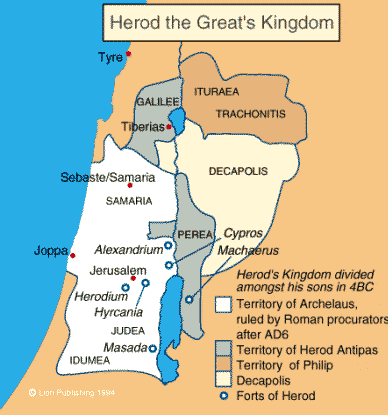|
Herod the Great 73-4 BC
Herod was the smooth talking, jealous, and murderous type. He was Arabic by
blood, Jewish by religion, Roman by citizenship, and king of Judaea
by trade.
Herod became famous for his many building projects and infamous for
killing all boys two years and under in Bethlehem and its
neighborhood in an attempt to get rid of
 Jesus, a possible rival to the
throne, or so it was gossiped.
Jesus, a possible rival to the
throne, or so it was gossiped.
Herod was a skilled horseman, military
commander, diplomat, and warrior. One year he even partook in the
Olympic Games.
Herod's Family
Herod's father was Antipater. A Jewish general poisoned
Antipater in the
year 43 BC and regretted it later when Herod returned
the favor and killed his father's murderer.
Herod's mother was Cypros, a high society girl from Petra,
Jordan.
Herod was his father's second son.
Herod's brothers were Phasael, Joseph, and Pheroras.
Herod's sister was Salome.
With his 10 wives and 15 children, Herod made
 Henry VIII almost look Amish. Some of the wives and children were the following:
Henry VIII almost look Amish. Some of the wives and children were the following:
Herod's first wife was Doris. They had a son together,
Antipater. Both mother and son were sent away by Herod so that
he could marry Mariamne I. Herod then changed his mind and
had Mariamne I, her two sons (Alexander and Aristobulus,)
her brother, her grandfather, and her mother (Alexandra) killed.
Mariamne II was the daughter of High Priest Simon.
With her Herod had a son named Philip, or Herod Philip.
Another wife was Cleopatra of Jerusalem. Their son was called
Philip.
Yet another wife was Malthace, with whom Herod had two sons:
Archelaus and Herod Antipas (the one who killed
John the Baptist.)
Confused?
 Check
out the Herodian Dynasty.
Check
out the Herodian Dynasty.
Herod's Political
Alliances and Career
Of course, Herod was pro-Roman because
Palestine was part of the Roman Empire at the time. In fact, Herod's family was granted Roman
citizenship by
 Julius Caesar.
Brown-nosing the Roman rulers was a tricky business because they changed so
rapidly and could be each other's enemies. Julius Caesar.
Brown-nosing the Roman rulers was a tricky business because they changed so
rapidly and could be each other's enemies.
But Herod kept up with the changes and skillfully switched his allegiances
from Julius Caesar to Gaius Cassius to Mark
Antony to Octavian (Augustus Caesar.)
Herod became governor of Galilee in 47 BC. In 41 BC Herod was made
tetrarch of Galilee.
Herod the King
Civil war broke out in Palestine in the year 40
BC. Herod fled to Rome, where the Romans declared him king of the
Jews and equipped him with an army to back up this decision at home.
Herod went back,
made good use of his troops, and ruled as king of Judaea from 37 BC
until his death in 4 BC.
Herod's Popularity
Herod was not admired by the Jews.

MAP OF HEROD'S KINGDOM
Click to enlarge
Herod's Building
Projects
Herod's building projects were many and most impressive.
Among them were the entire city of Caesarea including its artificial port,
and the city of
Sebaste (formerly Samaria.)
Herod also built an abundance of temples,
for instance the temple for the Jews in Jerusalem (which was completed in 64 AD,
four years before the Romans destroyed it again,) many temples in
honor of Caesar Augustus, and a temple at Rhodes in honor of Apollo.
Herod's Death
Herod became very ill and died in Jericho.
On his deathbed, Herod had a feeling that not too many tears
would be shed upon the news of his death. To make sure the day of
his death would be a really bad day for the Jews and to increase the general
amount of mourning, Herod imprisoned the Who's Who of Jewish society
and ordered to execute the entire bunch of them the second he died.
When he finally died, however, his orders were not carried out and the prisoners
were sent home unharmed.
In May 2007, Israeli archaeologist
Ehud Netzer claimed to have found Herod's tomb at Herodium
(today's Israeli-occupied West Bank.)
 Read the Washington Post article.
Read the Washington Post article.
Herod's Successors
Herod was succeeded by his sons Archelaus, Philip, and Antipas, who
divided Herod's kingdom among themselves as follows:
 Herod
Archelaus - Judaea, Samaria, Idumaea
Herod
Archelaus - Judaea, Samaria, Idumaea
 Philip - Iturea
Philip - Iturea
 Herod Antipas - Galilee and Peraea
Herod Antipas - Galilee and Peraea
(See map above)
Herod the Great Trivia
Herod's life was made into a
 movie in 1959 -
Herod the Great.
movie in 1959 -
Herod the Great.
The two main sources of information about Herod and the Herodian
Dynasty are the New Testament and
 Flavius Josephus.
Flavius Josephus.
And here are some ancient Jerusalem maps:

Ancient
Jerusalem

Jerusalem 1187
AD
More History
|